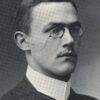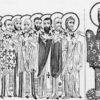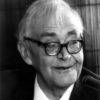Tag: Christological
The Christological Men: Karl Barth and TF Torrance
Barth and TF Torrance are the only modern theologians I have come across who if you don’t start with radically construed Chalcedonian premises, you won’t get. Their dialect is strictly christologically conditioned all the way down. This is one reason I think so many evangelical and conservative theologians of today write them off as incoherent. For example, theologians who harvest purely from the Post Reformed orthodox (pro), and some of the mediaeval theologians, will attempt to read Barth and TFT through the speculative, decretal categories they have imbibed vis-à-vis their recovery of said pro and med. theologians. And yet, this…
A Christological Reading of Holy Scripture Contra the neo-Marcionite “Bible Teachers” of the 21st Century
Let me be forthrightly clear: to follow a Christologically conditioned reading of Holy Scripture is not to be, at the same time, an implicit Marcionite. It is also not to suggest that the Old Testament history is simply the Hebrew peoples’ progressive knowledge of God, and thusly their writing thereof, as if it isn’t in fact heilsgeschichte, or the story of God’s in-breaking activity all throughout ‘salvation history,’ providentially and actively orienting and working through the events of said history in order to eventuate the actualization of his pre-destination in Jesus Christ to be for the world and not against…
Reading Scripture with the Christological and Trinitarian Grammar
This is from chapter 4 of what I presented for my PhD dissertation to Concordia Academic Theology Consortium. As many of you know I gave back that PhD. I am still working on the dissertation (to refine and add to it further), as it looks like it will be considered for another PhD (possibly) at an accredited school. Anyway, here’s a little excerpt: . . . I contend that since all orthodox Christians, in every place, operate with these conciliar categories—two natures/singular person—with reference to Jesus Christ, that it is this fortification, these grammatical loci, that fundamentally give hermeneutical shape…
Barth’s Christological Novum
Here is Barth talking about event, and how, as Samuel Adams says: “If the event contextualizes us, rather than being contextualized by us, then we can say that it is something new, since its origin is “outside” of us and has the nature of an “event. . . .”: God’s revelation in its objective reality is the person of Jesus Christ. In establishing this we have not explained revelation, or made it obvious, or brought it into a series of the other objects our knowledge. On the contrary, in establishing this and looking back at it we have described and…



